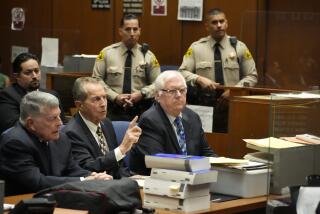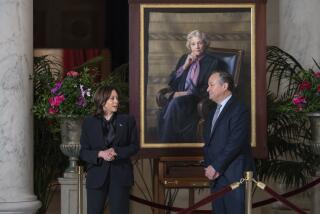Judge issued rulings on NBA, VCR cases
Warren J. Ferguson, a senior Circuit Court judge who served nearly 42 years on the federal bench and presided over several cases with broad implications, including a case that helped alter the way the NBA selects players, has died. He was 87.
Ferguson died June 25 of congestive heart failure at St. Jude Medical Center in Fullerton, said his son, Peter Ferguson.
Appointed to the U.S. 9th Circuit Court of Appeals by President Carter in 1979, Ferguson was widely regarded as a liberal and independent-minded jurist whose concern that people be treated fairly was paramount.
“It was not a job to him, it was a calling,” said Judge Stephen Reinhardt, who served on the 9th Circuit with Ferguson. “He was a . . . very compassionate and passionate man. He was [from] the days of the old-fashioned judges who really cared about human beings and who thought the purpose of law was justice.”
In the early 1970s, Ferguson heard the complicated case of Spencer Haywood, who sought to sign with the Seattle SuperSonics despite an NBA rule that prohibited players from signing until four years after high school.
Ferguson signed a formal order declaring the National Basketball Assn.’s four-year college rule illegal because it violated the Sherman Antitrust Act, which prohibits monopolies. The case made its way to the Supreme Court, which ruled in Haywood’s favor and opened the door for non-college graduates to enter the NBA.
In the 1979 case of Universal Studios vs. Sony Corp., Ferguson ruled that the makers of videocassette recorders were not liable for copyright infringement by people who used the machines to tape television shows.
Ferguson was one of four judges on the 9th Circuit Court in the mid-1980s whose cases were overturned by the U.S. Supreme Court more often than any other group of federal appellate judges. Some saw the 9th Circuit as a “maverick court,” bucking a more conservative Supreme Court.
“The West is a maverick region,” Ferguson said in a 1984 Times article. “If we’re a maverick court, it’s because the issues we confront are maverick issues.”
Ferguson was born Oct. 31, 1920, in the high desert town of Eureka, Nev. He earned a bachelor’s degree in economics from the University of Nevada at Reno in 1942. He served in the Army during World War II and received a Bronze Star for service in North Africa and Italy.
After the war he moved to Los Angeles, earned a law degree from USC in 1949 and the next year opened a practice, Ferguson and Judge, that lasted nine years.
While in private practice he served as city attorney for seven cities: Buena Park, Placentia, La Puente, Baldwin Park, Santa Fe Springs, Walnut and Rosemead.
Ferguson’s judicial career began in 1959 when he was appointed an Orange County Municipal Court judge in Anaheim. Two years later he was named to the Orange County Superior Court, and in 1966 Ferguson was nominated to the U.S. District Court for the Central District of California by President Johnson.
As a federal judge Ferguson handed a defeat to government attorneys in a Watergate-related matter when he dismissed a 1976 case against Frank DeMarco, the former tax attorney for President Nixon. Ferguson indicated that the conduct of the government had deprived DeMarco of a fair trial.
“He had a high respect for the law and especially respected precedent,” said William A. Norris, a former judge who served with Ferguson on the 9th Circuit for 17 years and is now in private practice. “While he had personal views that could fairly be described as liberal, he would not hesitate to decide a case contrary to the way he would have liked to have decided it.”
Over the years Ferguson, who held doctor of law degrees from Western State College of Law and San Fernando Valley College of Law, also taught at several colleges. He was an active judge until 1986, when he took senior status.
In addition to his son, Ferguson is survived by a daughter, Faye Ferguson of Corona, and four grandchildren. His wife, Laura Keyes Ferguson, died in 2005. A son, Jack Ferguson, died in Vietnam in 1970, and a daughter, Teresa Ferguson, died in 2001.
A private memorial service was held Tuesday. Memorial donations may be made to the Judge Warren J. Ferguson Public Interest Summer Fellowship, at the USC Gould School of Law, 699 Exposition Blvd., Los Angeles, CA 90089.
--
More to Read
Go beyond the scoreboard
Get the latest on L.A.'s teams in the daily Sports Report newsletter.
You may occasionally receive promotional content from the Los Angeles Times.










